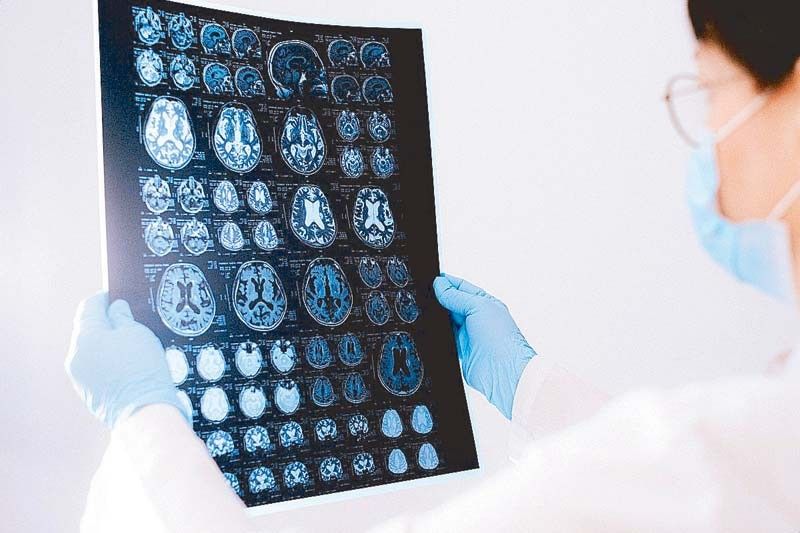Brain talk with top neurosurgeons


In 2021, a brain tumor patient had her 15 minutes of fame when she gamely played the flute and counted while undergoing a delicate brain surgery.
In a report by GMA 7’s Oscar Oida of 24 Oras, the then 32-year-old April Rodriguez Oliveros, underwent surgery called awake craniotomy, in a public hospital in Quezon City. Those who've seen the news clip were amazed at how cool the patient was during the entire procedure, while others (medical experts included) were in awe of the gifted hands of the neurosurgeon, who performed the surgery.
Awake craniotomy is a game-changing brain surgery, a delicate procedure that not all surgeons can perform or pull off.
And last Thursday, I had the privilege to meet the “brains” behind that successful operation — Dr. Michael N. Sabalza — during an exclusive media roundtable hosted by Makati Medical Center (MakatiMed).
During the talk, MakatiMed showcased a number of world-class neurosurgical procedures available in the country (specifically at MakatiMed), one of which is awake craniotomy surgery for brain tumor patients.

The beauty of awake craniotomy
Dr. Sabalza is the chief of the Neurosurgery Section at Makati Medical Center (MakatiMed), who also serves as the section head of Neurosurgery Section at Quirino Memorial Medical Center.
Dr. Sabalza specializes in brain and spine conditions. According to the amiable doctor, awake craniotomy is a highly specialized surgical technique that offers a “safer and more effective approach to brain tumor removal, while reducing the risk of neurological deficit. A neurological deficit refers to abnormal neurologic function of a body area. This altered function is due to an injury to the brain.
“Simply put, a deficit means that you’re not the same person again after the surgery,” explained Dr. Sabalza, who added that most patients are terrified of the idea of having awake craniotomy.
“Most of them are worried if they would be able to wake up after the surgery, while some fear that the procedure will left them an invalid,” shared Dr. Sabalza. “What they don’t realize is that all these apprehensions are usually addressed by doing awake craniotomy.
Every area of our brain — the cerebrum, cerebellum, and brainstream — has an important function. Say, for example, interpreting touch, vision and hearing, as well as speech, among others.
“And so, when the tumor develops in a function-sensitive area like the speech area, there’s a probability that the patient will not be able to talk once we take the tumor out,” shared Dr. Sabalza. “Surgery in these areas could cause several neurological deficits. And sometimes, if the neurosurgeon is not really adept at taking out these tumors, he/she could end up doing incomplete surgery.”
This means that there will be a residual tumor that will be left.
“Remember, an incomplete surgery has a negative impact on the overall survival of the patient,” warned Dr. Sabalza. “Whether it’s benign or malignant, if you leave it there, it’s going to come back.”
And this is where awake craniotomy comes in.
“Interestingly enough, God made our brains numb,” noted Dr. Sabalza. “Our brain has no pain sensor. Only the skin and the outer covering of the brain have pain sensors.”
A good example is the “brain scene” in the movie, Silence of the Lambs.
In that scene, Hannibal Lecter is shown eating the parts of the brain of the person who’s awake. When Hannibal said, “I’m going to eat your speech area,” all of a sudden the person couldn’t speak anymore.
“That’s how awake craniotomy or brain surgery works. It allows us to remove the brain tumor without damaging the patient’s brain because we get to observe its functions during the entire surgery,” explained Dr. Sabalza. “We get to monitor his motor skills. If the tumor is in the, say, reading area of the brain, we ask the patient to read while undergoing surgery.”
According to Dr. Sabalza, awake surgery is done with a clinical psychologist.
“There’s an extensive screening. Before we operate, we have to establish what their baseline neurological function is,” he added.
Awake craniotomy gives neurosurgeons like Dr. Sabalza better outcomes.
“And because the patient is awake throughout the surgery, it’s more economical because the patient need not pay for an anesthesiologist. Also, if everything is okay after the surgery, the patient can skip the ICU. We will just do a scan two hours after the surgery to make sure that there’s no bleeding and brain swelling. If everything is A-okay, the patient can go back to his regular room. Usually after three to four days, can already go home.”
And the good news is, awake craniotomy is one of the services offered at MakatiMed since 2018.

Offering world-class neurological care
Worldwide, neurological disorders are the primary cause of physical and cognitive disability, impacting approximately 15 percent of the global population.
In the Philippines, MakatiMed handles the increase in neurological disorders by doubling down on their commitment to world-class neurological care.
Aside from awake craniotomy, MakatiMed offers other world-class neurological procedures not only for brain tumor patients, but also cerebral bypass surgery, and stereotactic radiosurgery (SRS).
“Filipinos only stand to benefit from innovations in neurological care. New and improved procedures make the recovery process easier for the increasing number of Filipinos with neurological disorders,” enthused Dr. Saturnino Javier, medical director, MakatiMed. “It’s hard to understate the importance of a sound neurological condition given its impact on cognitive functions, which directly shapes one’s quality of life.”
The emphasis on a smooth recovery is apt considering MakatiMed’s track record. Since 2018, for example, the hospital has offered awake craniotomy.
“Just like what Dr. Sabalza said, awake craniotomy not only minimizes risks. Our team also offers postoperative care to ensure patients get back to their regular lives easily,” shared Dr. Guillermo Victorino Liabres of MakatiMed’s Section of Neurosurgery..
Dr. Liabres noted that he also has a 100-percent patency rate for cerebral bypass surgeries.
A pioneering cerebrovascular neurosurgeon with extensive experience in intracranial bypass surgery, Dr. Liabres explained that cerebral bypass surgery is a procedure that aims to restore or to reconstitute blood flow in the brain.
“The purpose of the this is to redirect blood around blocked or deceased arteries in the brain,” explained Dr. Liabres. “Stroke happens when there are blockages. And if there’s lack of blood flow, there will be parts of the brain that will die. So bypass is something that will bypass the problem.”
The complex procedure, which is occasionally necessary for cranial or head and neck tumors, involves using a blood vessel from another part of the body to redirect blood flow around blockages in the brain.This procedure utilizes blood vessels coming from the skull or blood vessels from the brain itself.
“In short, I’m a glorified tubero (plumber). That’s how I explain the procedure to my patients.”
Everything you need to know about stereotactic radiosurgery (SRS)
MakatiMed is also proud to be a pioneer when it comes to SRS, having built a program back in 1996.
Dr. Sabalza underlined the precision and versatility of SRS. “It’s known to be exceptionally precise when treating a range of brain and spine abnormalities like cancer, epilepsy, trigeminal neuralgia, and arteriovenous malformations.”
MakatiMed’s SRS program shows it doesn’t hesitate to share new innovations with other local hospitals.
Hospitals in the Metro Pacific Health network (which MakatiMed is a part of) receive collaborative care from MakatiMed for SRS. These collaborations extend the efficacy of SRS to thousands of patients across the Philippines, guaranteeing better treatment and recovery well beyond its immediate scope.
From the consistently high success rates of its pioneering neurosurgical procedures to the decades-long experience and expertise of its doctors, MakatiMed demonstrates that world-class care can be found at home. “Cases of neurological disorders are on the rise, and that means doctors and hospitals must beable to adapt and evolve,” Dr. Javier shared. “Though it won’t be easy, it is a challenge we certainly welcome.”
He also emphasized that given all these top-of-the-line treatment options, MakatiMed also spending considerable time on wellness and prevention.
“MakatiMed dedicates and allocates a significant time also for wellness and prevention of these diseases. These are the things that we don’t want to happen to anyone. Nonetheless, if they’re already afflicted, rest assured that MakatiMed has the available resources to address their health problems.” Dr. Javier added.w
* * *
For information, call MakatiMed On-Call at 8888-8999, emailmmc@makatimed.net.ph, or visit www.makatimed.net.ph. Follow @IamMakatiMed on Facebook and Twitter.



















